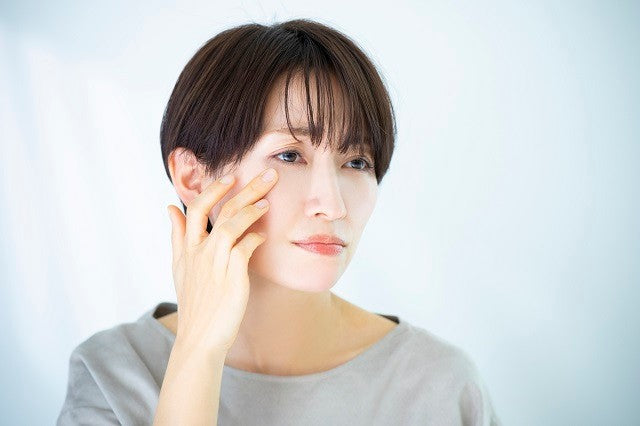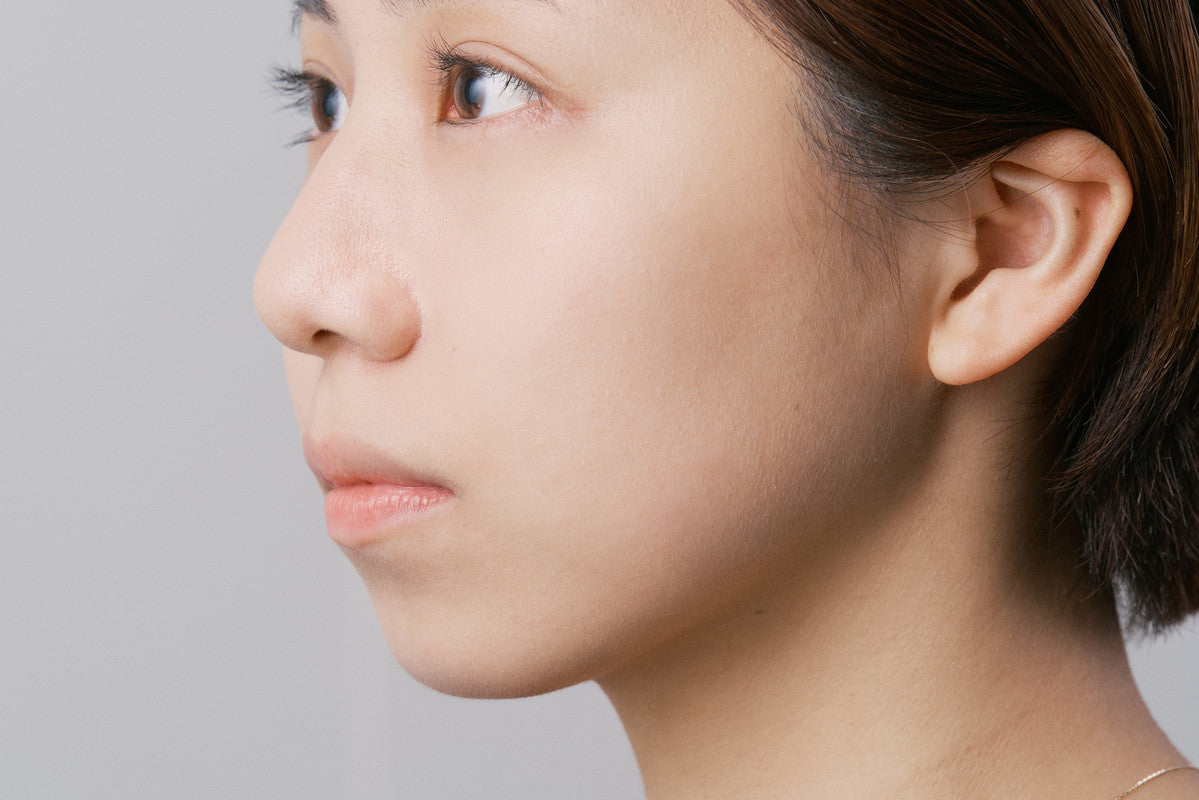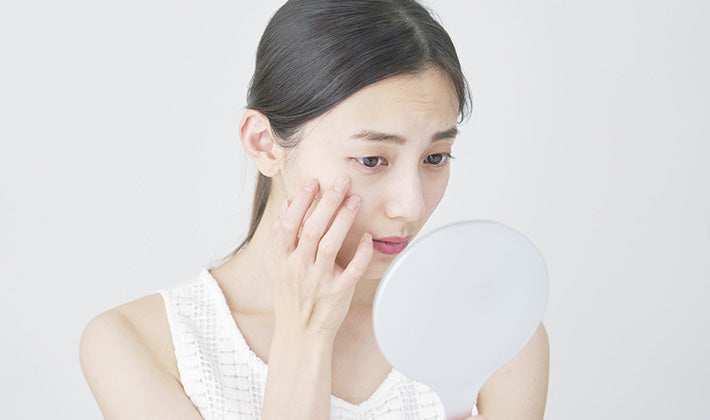
#oily skin #Skin Problem
2023/12/05
Skin care tips for oily skin: 4 causes of oily skin and how to improve it!
Topic
Skin problems
There are many people who are concerned about their oily skin and shiny faces. It is usually caused by an overproduction of sebum, an oily substance your skin needs in order to function properly, but the ex-cess sebum may affect your skin.
This article introduces the overview and causes of oily skin, as well as the ways to improve oily skin. We also have effective skin care tips for problems with shiny skin or make-up coming off easily. We hope this information is useful to you!
- What is oily skin?
- Common problems found in oily skin
- 4 causes of oily skin
- Skincare tips for oily skin
- Good habits for improving oily skin
- The recommended skincare products for oily skin
- Let's start getting rid of oily skin fundamentally for one year!
What is oily skin?

Oily skin is the skin that excessively products sebum. Normally, the oiliness caused by sebum is important to protect our skin from dryness. However, sebum overproduction means that the skin's barrier function has deteriorated. In other words, your skin condition is so vulnerable that it must be protected by sebum.
Besides oily skin, let's check out the other skin types below!
| Normal skin: | good balance between moisture and sebum |
|---|---|
| Oily skin: | Oily zone all over |
| Combination skin: | Dry in some spots (cheeks) and oily in others (forehead, nose, and chin) |
| Inner dry (hidden dry skin): | Externally oily and internally dry skin |
| Dry skin: | Dry zone all over |
Sebum overproduction is caused by 3 types: oily, combination, and inner dry skin. These are difficult to distinguish at first glance, but oily skin is different from combination skin and inner dry skin in terms of “the skin is moisturized"". If there is no dryness and the face is abnormally shiny and sticky all the time, you can say it is most likely oily skin.
To prevent sebum overproduction, which is the cause of oily skin, it is essential to improve the skin's barrier function.
Skin condition is not always the same as when you were born, but it changes depending on your lifestyle, skincare, and seasons.
These changes in skin condition may have a chance of getting better if you know the causes and continue to take care of your skin properly.
Common problems found in oily skin
If you are wondering, "Does my skin type have oily skin?" please check if you have any of the following problems:
- The face, especially the nose, is shiny.
- Suffering from acne and pimples.
- Continually having skin problems due to oily skin.
- The skin type changed when you were pregnant, and then you had oily skin.
- The skin is originally oily, so the makeup does not stay on.
- The skin becomes more oily in the summer.
- Accidentally touched the acne around the face.
- Rough skin is a concern, maybe because of a weak stomach and tending to be stressed.
Oily skin problems vary, but many people suffer from problems caused by excessive sebum production. Some have problems with the skin itself, such as shiny faces and rough skin (adult acne pimples), while not a few people suffer from indirect problems caused by sebum, such as makeup smudging. Some of them feel that their skin texture has vaguely changed due to pregnancy.
As mentioned above, skin care methods that only eliminate sebum can cause the condition to worsen. The causes of oily skin should be different for each individual, so first understand the causes and use the skincare products that suit you.
4 causes of oily skin
There are 4 main causes of oily skin:
- Remove sebum too much
- Not moisturizing
- Hormonal imbalances
- Irritated skin from the wrong skin care habits
Cause1. Removing sebum too much
People with oily skin are sensitive to skin problems caused by too much sebum. Therefore, people tend to think that "the sebum is a bad thing" and need to get rid of it from the face. However, excessive sebum removal increases sebum production and causes oily skin.
Excess sebum can cause the skin to appear too shiny or oily and clog pores, leading to breakouts. However, sebum also plays an important part in maintaining a healthy skin barrier, which protects the skin from external stimuli and keeps your skin moisturized. If you remove sebum too much by washing your face or using blotting papers, your skin will produce more sebum in order to protect itself, which is a vicious cycle.
Also, some people who suffer from shiny or sticky skin may not be using the right blotting papers, and rubbing the face too hard would cause overproduction of sebum and irritated skin.
Cause2. Lack of moisture
People with oily skin may have dehydrated skin. In order to strengthen skin barrier function, it is important to provide the stratum corneum with plenty of moisture. When your skin lacks moisture, the skin barrier function is weak and the skin becomes vulnerable to external stimuli, which can lead to acne, eczema, and other skin problems, so moisturize properly.
Even though the oily skin type naturally produces more sebum than other types, this doesn’t mean that it requires any less moisture. In fact, when your skin isn't properly hydrated, it may naturally compensate by producing even more sebum. So it is important to enhance moisture in your skin by using the correct skincare products.
Cause3. Hormonal imbalances
Women's skin is greatly affected by hormonal imbalances. For example, many women suffer from rough skin during puberty and periods because the hormones that stimulate sebum secretion are activated. Producing sebum, which is originally not necessary, causes the face to become shiny and sticky.
That is only temporary oily skin, and your skin will settle in about 2 weeks, so there is no need to change your skincare in particular. However, sometimes people who do not have oily skin think that “I have oily skin” and start skincare for oily skin. Of course, there is no problem if you use the correct skincare products, but with continued skincare that removes sebum, your temporary oily skin will become chronic.
Hormonal imbalance during puberty and periods is inevitable. It is important to understand that temporary oily skin occurs at different times of the year and to deal with it without panic.
In some cases, oily skin is caused by an imbalance between female and male hormones, but it is important to look over your daily habits to maintain hormonal balance.
Cause4. Irritated skin from the wrong skin care habits
When you take care of your skin with the wrong skincare routine, it leads to irritation of the skin and causes excess sebum production.
Let's find out the wrong daily habits that can irritate the skin and increase sebum production:
- Washing the face many times a day
- Washing face with hot water (too cold water)
- Scrubbing the face when cleansing or washing the face
- Frequent use of blotting paper
- Continuing care that causes friction, such as peeling
- Not protecting the skin from UV rays
If you're following the above habits, your skincare may be the cause of your oily skin. Please change it and switch to proper skin care habits.
Skincare tips for oily skin
Please look at the following important points to improve your oily skin:
Point1. Do not remove sebum too much
Sebum is like a barrier that protects your skin from dryness. If you remove sebum too much, it can lead to overproduction of sebum and eventually dry out the skin, so if you are using skincare that removes sebum, shift to skincare that does not remove too much.
Cleansing agents and facial cleansers with strong detergent power can wash away even the necessary sebum. For example, it’s better to avoid skincare products containing benzoyl peroxide, salicylic acid, or surfactants.
Also, it is recommended to use gel-type cleansers, as liquid oil cleansers may remove sebum too much. Choose the one that is gentle in ingredients and washing, and keep in mind that skincare should remove only unnecessary sebum.
Point2. Prevent irritated skin and maintain the barrier function
To reduce sebum secretion, which is the cause of oily skin, it is essential to maintain the skin's barrier function and not use or do anything that will irritate your skin.
You should touch your skin gently, not give it friction. For example, when cleansing or washing your face or wiping your face with a towel, you should be careful, as friction can easily cause irritation. Refrain from scratching or rubbing the eye area due to pollen or allergies because it irritates the skin. In addition, using cotton pads or patting when applying lotion or using a stick or tip when applying makeup can also damage the skin if too much force is applied. Try to avoid touching the skin as much as possible, and be aware of touching gently when touching it for skincare or makeup. Skin type is inherent and changes with habits, skincare, season, and so on. These changes in skin condition may have a chance of getting better if you know the causes and continue to take care of your skin properly.
Point3. Ensure protection against UV rays thoroughly
Exposure to UV rays decreases the moisture content of the skin, causing excessive sebum production to prevent the skin from becoming dry. Continuous exposure to UV rays not only worsens skin quality but causes all kinds of skin problems, so take thorough measures against UV rays all year round.
UV rays fall at any time of the year when the sun is out, regardless of the season or weather. Even a small amount of UV rays can damage your skin, even if only for a few minutes, so it is important to protect your skin with sunscreen, of course, as well as hats, umbrellas, sunglasses, and clothing with UV protection. Also, UV rays can pass through window glass and reach the inside of a room, so it is important to pay attention to UV rays even when indoors.
Good habits for improving oily skin
A good habit is essential for improving oily skin. Besides skincare products, here are some daily habits to improve oily skin that you should be aware of!
Point1. Get enough sleep
To improve skin condition, it is important to get enough and good-quality sleep because sleep deprivation causes a hormonal imbalance, which in turn causes an imbalance in sebum production. It worsens metabolism and disrupts the balance of moisture and sebum in the skin.
Also, sleep greatly affects the autonomic nervous system, which controls the functions of the entire body while maintaining a balance between the sympathetic and parasympathetic nerves. Lack of sleep causes the sympathetic nervous system, which produces a state of tension, to be constantly dominant. Because the sympathetic nervous system activates male hormones, the amount of sebum increases, causing shiny and sticky skin.
Let’s adjust our sleep habits, try to go to bed early, wake up early, and make efforts to improve the quality of sleep.
Point2. Improve eating habits
It is also recommended to review your eating habits and nutrients that help improve skin conditions. The recommended nutrients for people with oily skin are vitamins B1, B2, C, and pantothenic acid.
Vitamin B1 suppresses the amount of sebum production and supports collagen production. This nutrient is abundant in the liver, eggs, milk, mackerel, natto, etc. Also, the one that controls sebum production is vitamin B1, which is abundant in pork, cod roe, eel, peanuts, brown rice, etc.
Vitamin C protects skin cells from oxidation, so it helps prevent skin problems. Pantothenic acid is a nutrient that is essential for energy metabolism and is also characterized by relating to the synthesis of stress-relieving hormones.
All of these nutrients are contained in foods that can be easily incorporated into daily habits. Let's try to incorporate them into your daily diet while considering nutritional balance.
Point3. Improve bad habits (smoking and drinking)
Smoking is also related to increased sebum production. When cigarette smoke adheres to the skin's surface, the skin considers the smoke harmful and stimulates sebum production to protect the skin. Besides, do not drink too much alcohol because they are high in sugar, such as beer and cocktails, promote the overproduction of sebum, dilate capillaries, and stimulate sebaceous glands.
So try to avoid drinking or smoking too much and relax your body by making a habit of taking care of it.
The recommended skincare products for oily skin
If you have oily skin, you may easily be confused about how to choose skincare products by avoiding products that are too sticky. So we recommend you take care of your skin by using the one-line products, "Domohorn Wrinkle," that cover every essential step of your skincare routine, from cleansing to nourishment to UV protection, to keep your skin moisturized and balance sebum.
Point1. "Oil-in-Gel Remover" that does not remove sebum too much.
For oily skin, it is important not to remove sebum too much because the moisture will be removed from the skin and lead to dry, irritated skin. "Oil-in-Gel Remover" is a gel-type make-up remover that gently removes excess sebum stains without stripping the skin of moisture.
Point2. "Intense Hydrator" moisturizes the skin perfectly with its rich yet lightweight texture.
"Intense Hydrator" uses BG as the base ingredient in its cosmetics. BG is an ingredient that relatively reduces stickiness, so it is recommended for people with oily skin who are concerned about stickiness and shine. Also, it contains 21 carefully selected natural moisturizing ingredients that, in perfect harmony, help keep the skin hydrated.
Point3. "Milky Veil Lotion" balances the skin's sebum while keeping moisture in your skin.
"Milky Veil Lotion" contains natural ingredients that control sebum. "Yamaga Organic Silk Powder" absorbs excess sebum, balances sebum secretion, and makes makeup last longer. "Uchiwa Cactus" complements the ingredients that are abundant in human skin, which prevents sebum overproduction due to dryness and maintains an appropriate sebum balance.
Let's start getting rid of oily skin fundamentally for one year!
To improve oily skin, it is important to enhance the skin barrier function, but it is difficult to stop sebum overproduction with quick-acting measures. If you want to improve the oily skin itself, you need to continue to care for at least a year. It will take time, but your skin will look different afterward.




